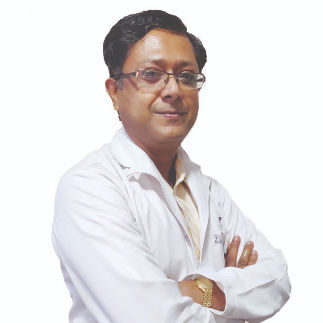Difference Between Heart Rate and Pulse Rate
Know everything about Heart and pulse rate, its measurements, how they differ and why it is vital to know the difference.


Introduction
When it comes to heart health, terms like heart rate and pulse rate are often used interchangeably. However, they are not exactly the same. Understanding the difference between the two can help you monitor your health better and communicate more effectively with your doctor.
The article will discuss what heart rate is, how to measure it, etc. how to differentiate the pulse and heart rate and the significance of monitoring it.
What Is Heart Rate?
Heart rate refers to the number of times your heart beats per minute (BPM). It is a measure of how efficiently your heart is pumping blood throughout your body.
How Is Heart Rate Measured?
Heart rate is typically measured using an electrocardiogram (ECG or EKG), which records the electrical activity of your heart. Some fitness trackers and smartwatches also provide heart rate readings using optical sensors.
Normal Heart Rate Range
- Adults (18+ years): 60–100 BPM (at rest)
- Athletes or highly active individuals: 40–60 BPM (due to better cardiovascular efficiency)
- Children: 70–120 BPM (varies with age)
Consult Specialist Cardiologist expert advice for further information.
What Is Pulse Rate?
Pulse rate is the number of times you feel an artery expand and contract in one minute. It is a physical manifestation of your heartbeats as blood flows through your arteries.
How Is Pulse Rate Measured?
You can measure your pulse by placing two fingers (not your thumb) on:
- Wrist (radial artery)
- Neck (carotid artery)
- Groin (femoral artery)
- Top of the foot (dorsalis pedis artery)
Count the beats for 30 seconds and multiply by 2 to get your pulse rate per minute.
Normal Pulse Rate Range
Pulse rate should ideally match heart rate in a healthy person. However, in certain conditions, they may differ.
Key Differences Between Heart Rate and Pulse Rate
When Do Heart Rate and Pulse Rate Differ?
In some cases, your heart rate and pulse rate may not match. This can happen due to:
- Arrhythmias (Irregular Heartbeats) – Conditions like atrial fibrillation can cause the heart to beat irregularly, leading to a mismatch.
- Weak Pulse – Conditions like peripheral artery disease (PAD) can weaken the pulse, making it hard to detect.
- Blood Clots or Blockages – Reduced blood flow can make the pulse weaker than the actual heart rate.
- Dehydration or Shock – Low blood volume can reduce pulse strength.
Why Monitoring Both Matters?
Monitoring of heart and pulse rate is essential for assessment, it helps by
- Assessing overall heart function.
- Helps detect circulation problems.
If you notice a significant difference between your heart rate and pulse rate, consult a doctor.
Tips for Maintaining a Healthy Heart Rate and Pulse Rate
Management of heart and pulse rate through self-care adds to their total care. Find below a few tips for maintaining heart and pulse rate.
- Exercise Regularly – Moderate activities like walking, cycling, or swimming improve heart efficiency.
- Stay Hydrated – Proper hydration ensures good blood circulation.
- Eat a Heart-Healthy Diet – Include fruits, vegetables, whole grains, and lean proteins.
- Manage Stress – Practice deep breathing, meditation, or yoga.
- Avoid Smoking & Excessive Alcohol – Both can negatively affect heart function.
- Monitor Regularly – Use a heart rate monitor or check your pulse manually.
When to See a Doctor?
Consult a doctor if you experience:
- A resting heart rate consistently above 100 BPM (tachycardia)
- A resting heart rate below 60 BPM (bradycardia) without being an athlete
- Irregular pulse or skipped beats
- Dizziness, shortness of breath, or chest pain
Final Thoughts
While heart rate and pulse rate are closely related, they are not identical. Monitoring both can give you a better understanding of your cardiovascular health. Simple lifestyle changes can help maintain a healthy heart, but always seek medical advice if you notice unusual patterns.
Consult Specialist Cardiologist expert advice for further information.
Consult Specialist Cardiologist expert advice for further information.

Dr. Prashant Adeppa
Cardiologist
10 Years • MBBS, MD General Medicine, DM Cardiology (Armed Forces Medical College)
Bengaluru
Apollo Hospitals Bannerghatta Road, Bengaluru

Dr. Nirmal Kolte
Cardiologist
8 Years • MBBS MD (Medicine) DM (Cardiology)
Nashik
Apollo Hospitals Nashik, Nashik
Dr. Praveen Jaiswal
Cardiologist
17 Years • MD(Medicine), DM(Cardiology)
Indore
Apollo Hospitals Vijay Nagar, Indore

Dr. Subir Ghosh
Cardiologist
16 Years • MBBS; MD(MED); DM(Cardio)
Ahmedabad
Apollo Hospitals Gandhinagar, Ahmedabad

Dr. Sampath Kumar Madapati
Cardiologist and Electrophysiologist
2 Years • MBBS, MD General medicine, DM cardiology AIIMS new Delhi, DMH, Fellowship in clinical cardiac electrophysiology
Hyderabad
Apollo Hospitals D R D O kanchanbagh, Hyderabad
Consult Specialist Cardiologist expert advice for further information.

Dr. Prashant Adeppa
Cardiologist
10 Years • MBBS, MD General Medicine, DM Cardiology (Armed Forces Medical College)
Bengaluru
Apollo Hospitals Bannerghatta Road, Bengaluru

Dr. Nirmal Kolte
Cardiologist
8 Years • MBBS MD (Medicine) DM (Cardiology)
Nashik
Apollo Hospitals Nashik, Nashik
Dr. Praveen Jaiswal
Cardiologist
17 Years • MD(Medicine), DM(Cardiology)
Indore
Apollo Hospitals Vijay Nagar, Indore

Dr. Subir Ghosh
Cardiologist
16 Years • MBBS; MD(MED); DM(Cardio)
Ahmedabad
Apollo Hospitals Gandhinagar, Ahmedabad

Dr. Sampath Kumar Madapati
Cardiologist and Electrophysiologist
2 Years • MBBS, MD General medicine, DM cardiology AIIMS new Delhi, DMH, Fellowship in clinical cardiac electrophysiology
Hyderabad
Apollo Hospitals D R D O kanchanbagh, Hyderabad



